|
|
|
Sort Order |
|
|
|
Items / Page
|
|
|
|
|
|
|
| Srl | Item |
| 1 |
ID:
141407


|
|
|
|
|
| Summary/Abstract |
The car bomb sounded like a car backfiring. I heard it, dismissed it, and went back to sleep. It was only a few hours later, as I sat at the window of Erbil’s Hotel Merci, looking out over a two-story image of Leo Messi advertising Pepsi, that I realized how close I had been—too close for comfort—to the city’s first bombing in nearly a year. It had exploded only a few blocks away.
|
|
|
|
|
|
|
|
|
|
|
|
|
|
|
|
| 2 |
ID:
141408
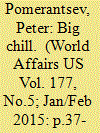

|
|
|
|
|
| Summary/Abstract |
After most Central European states joined the EU and NATO, it seemed that the last page of Cold War history had been turned. But reports of the death of conflict in the region turned out to have been greatly exaggerated. Russia is on the move again, aiming to show the world that NATO has feet of clay, that the EU is a geopolitical weak sister and the transatlantic alliance a myth. The US might be slowly waking up to the challenge of Vladimir Putin’s evermore expansionist Russia, but it still considers the issue a “regional” problem. The Kremlin’s objective is not to send tanks into Tallinn, however, but to compromise the White House.
|
|
|
|
|
|
|
|
|
|
|
|
|
|
|
|
| 3 |
ID:
141414
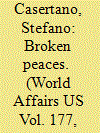

|
|
|
|
|
| Summary/Abstract |
Oslo is history. Twenty years have passed since the last significant peace accord between the Israelis and the Palestinians. The intervening years have been marked by an intifada and three military interventions in Gaza by the Israel Defense Forces that have left around seven thousand Palestinians and one thousand Israelis dead. The so-called “Peace Process” is in tatters and there seems to be no way of re-stitching it.
|
|
|
|
|
|
|
|
|
|
|
|
|
|
|
|
| 4 |
ID:
141416
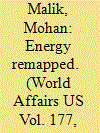

|
|
|
|
|
| Summary/Abstract |
Geopolitics and geology have always been closely interlinked. Historically speaking, every international order is based on an energy resource. We moved from the Age of Sail to the Age of Coal and Steam—the latter the basis of the Pax Britannica. When the British literally ran out of steam, the Pax Americana emerged on the basis of oil, gas, and nuclear energy. Today the Chinese, hoping to usher in the age of the Pax Sinica, have been investing heavily in alternative energy resources. But just when China and others were writing off America as a declining power, the country finds itself on the cusp of achieving energy self-sufficiency. Will the shale revolution last long enough for Washington to rejuvenate itself and prolong American dominance of the international order? The doom and gloom that preceded the global financial meltdown in 2008 has certainly given way to an energy boom six years later. Soaring North American shale gas and oil, plus oil sands production and growing Asian dependence on the Middle East, are transforming global energy markets. The geopolitical ramifications could turn yesterday’s winners into tomorrow’s losers—and vice versa.
|
|
|
|
|
|
|
|
|
|
|
|
|
|
|
|
| 5 |
ID:
141409
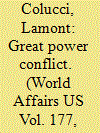

|
|
|
|
|
| Summary/Abstract |
Observances last year of the one hundredth anniversary of the Great War, as it was known until a second global conflict gave it a roman numeral, have paid deference to its status as the most brutal conflict in human existence as well as one whose influence we still live with today.
|
|
|
|
|
|
|
|
|
|
|
|
|
|
|
|
| 6 |
ID:
141404


|
|
|
|
|
| Summary/Abstract |
Students in Hong Kong packed their tents, said goodbyes, and ended their occupation in the center of the city. Moments later, some seven thousand police officers, working two shifts over the course of seven hours, dismantled barriers, removed debris, and arrested two hundred and forty-seven protesters who chose to make a final statement by remaining. By the end of the seventy-fifth day of the noisy pro-democracy demonstrations, traffic was flowing by government headquarters on Connaught Road, where once more than a hundred thousand Hong Kong residents congregated in defiance of China.
|
|
|
|
|
|
|
|
|
|
|
|
|
|
|
|
| 7 |
ID:
141413
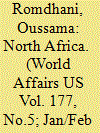

|
|
|
|
|
| Summary/Abstract |
Tunisians were holding their breath as the country got ready for its first legislative elections since the Arab Spring revolution. Jihadists threatened to derail the electoral process. Three days before the October 26th vote, security forces disrupted a terrorist plot in the south. A day later, they struck a jihadist hideout near Tunis, the capital; six suspected terrorists, including five women, and one security officer were killed in the clashes.
|
|
|
|
|
|
|
|
|
|
|
|
|
|
|
|
| 8 |
ID:
141405
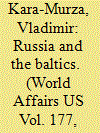

|
|
|
|
|
| Summary/Abstract |
MOSCOW — This may be hard to imagine, but there was a time when the national independence movements in the Baltic states had no greater ally than Russia, and its leader. As Soviet tanks rolled into Vilnius to crush Lithuania’s independence aspirations in January 1991, Boris Yeltsin—speaker of Parliament and head of state of the Russian Federation, then still a constituent part of the USSR—made a strong public stand against the Kremlin’s aggression and backed self-determination for the Baltic republics. In what Western diplomats—and many of his own supporters—considered a “crazy” move, Yeltsin then flew to the Estonian capital of Tallinn to sign a joint statement of mutual support with the leaders of the three Baltic states, as well as separate cooperation treaties with Estonia and Latvia, recognizing their “inalienable right to national independence” in an act that, in the opinion of many observers, prevented further bloodshed. While in Estonia, Yeltsin met with Soviet troops stationed there and urged them to disobey any orders from their Kremlin commanders to crush peaceful demonstrators. On the advice of friends, who had (well-founded) fears that the KGB might try to shoot down his plane, Yeltsin returned to Russia in a private car.
|
|
|
|
|
|
|
|
|
|
|
|
|
|
|
|
| 9 |
ID:
141412
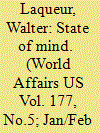

|
|
|
|
|
| Summary/Abstract |
This article deals with the purely political aspects of the present strategic debate in Russia. The economic crisis caused by the sanctions, the sharp decline of the value of the ruble, and above all the fall of the price of oil and gas have only added to the acuteness of the feeling of crisis. But these aspects have been analyzed and commented upon at great length elsewhere.
|
|
|
|
|
|
|
|
|
|
|
|
|
|
|
|
| 10 |
ID:
141415
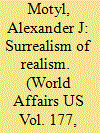

|
|
|
|
|
| Summary/Abstract |
Most general readers following events in Ukraine may not be aware that much of the debate and many of the policy prescriptions among “experts” have been dominated by a school of thought in international relations scholarship known as “realism.” In a nutshell, realists have argued that US policy toward the Russo-Ukrainian conflict should be driven by pragmatic American interests and by the realities of Russia’s regional great-power status—two propositions few would disagree with. Realist arguments become more controversial, however, when they go on to insist that Russia’s behavior toward Ukraine is actually a reasonable response to Western attempts to wrest Ukraine from Russia’s sphere of influence and that the culprit behind the ongoing Russo-Ukrainian war is, thus, the West in general and the United States and NATO in particular.
|
|
|
|
|
|
|
|
|
|
|
|
|
|
|
|
|
|
|
|
|